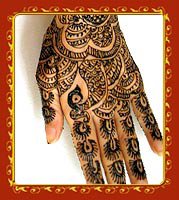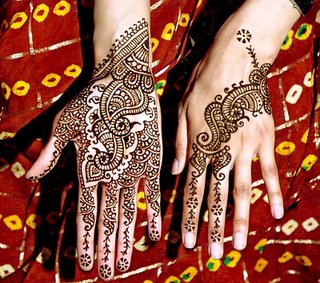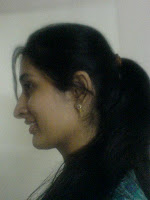 Famous saying goes: sweet rewards come to those who wait. That is so true after fasting for 30 days during the holy month of Ramadan, as Eid is the best thing one could get in return. And as the festivity comes nearer I remember my mother telling me about the sweet rituals of her time. The divine fragrance of attar left many happy moments and sweet memories on Eid day of which she would remain with her always.
Famous saying goes: sweet rewards come to those who wait. That is so true after fasting for 30 days during the holy month of Ramadan, as Eid is the best thing one could get in return. And as the festivity comes nearer I remember my mother telling me about the sweet rituals of her time. The divine fragrance of attar left many happy moments and sweet memories on Eid day of which she would remain with her always. ‘So eventually the days of Ramadan passed, taking their blessings with them and on the last night of it, when the new moon was sighted on ‘Chaand Raat’ (Night of the Moon) the hustle and bustle of Eid begin,’
So Eid was knocking on our doors, promising to bring with it a flurry of activities. From savory smells emanating from the kitchen, to dusting and draping, bringing out the good china, and last minute shopping, there was a marked air of renewal and celebration all around.
It was the night before Eid, and the auspicious crescent had been sighted, but for women, both young and old alike, something seemed amiss without a rich and pungent coat of mehendi adorning their hands.
Women pool together in their drawing rooms, an atmosphere of merriment about them as they proceed to apply mehendi in intricate patterns on each other’s hands and feet. The art of applying mehendi is almost a ritual in itself, one that adds an extra slice of mirth to the holy occasion.
However, not many are aware of the way of applying this cosmetic paste in gorgeous and enticing manner. The person in your neighbors, cousins or friends who knows th is art becomes the most vital personality and everybody try to approach her. Luckily or unluckily I also know a lilt bit about applying mhendi and …. same thing happened with me on Channd Raat just after the iftar as the moon was declared I started receiving number of friends and cousin. it was very difficult to manage when everybody was asking and calling “Ayesha” “Ayesha” ”Ayesha yarr its my turn now”..and “I m ur elder cousin so please my turn first” “Ayesha baji main bachi hoon pahlay meari barri” and a lot of stuff like this. Coz everybody was impatient to get their hands decorated in any way. Small girls were very much enthusiastic …and they end in adorning all sides of hands and feet. I noticed the zeal of kids, young’s and old that everybody wants to look dazzling from head to feet by applying gorgeous styles and designs of mhendi.
is art becomes the most vital personality and everybody try to approach her. Luckily or unluckily I also know a lilt bit about applying mhendi and …. same thing happened with me on Channd Raat just after the iftar as the moon was declared I started receiving number of friends and cousin. it was very difficult to manage when everybody was asking and calling “Ayesha” “Ayesha” ”Ayesha yarr its my turn now”..and “I m ur elder cousin so please my turn first” “Ayesha baji main bachi hoon pahlay meari barri” and a lot of stuff like this. Coz everybody was impatient to get their hands decorated in any way. Small girls were very much enthusiastic …and they end in adorning all sides of hands and feet. I noticed the zeal of kids, young’s and old that everybody wants to look dazzling from head to feet by applying gorgeous styles and designs of mhendi.
Designs vary from country to country. Indian mehendi art incorporates fine lines, with lace-like and floral patterns, while Moroccan and African designs are thicker, bolder, and with geometric angles. Henna is also simply applied in a thick layer on the palms and soles of feet, as is sometimes practiced in our own country.
Asides its aesthetic element, henna is believed to hold special medicinal value. It is said to soothe dry skin, heal certain skin diseases, and reduce swelling. Even beverages are concocted out of it for stomach cramps and headaches.
Undoubtedly, henna is more than just a cosmetic paste, its cultural and traditional worth making it a part and parcel of many festivals. In our country , Pakistan, heena adds an extra celebration in wedding ceremonies. Girls and friends of bride apply beautiful designs of heena on bride’s hands and sing beautifull songs of mehndi like “Mehndi say likh do ri hatoon pay sakhyoo maray sanwarya ka namm” meaning thereby is (write the name on my palms of my beloved with mehndi)
From weddings and engagements to religious occasions, all remain more or less incomplete without it. With only a few days left before Eid, one can already visualise the halwa and paratha laden table and hear the merriment of female relatives and friends alike, assembled together the night before Eid as they usher in the celebrations with joyful anticipation, and with intricately designed mehendi on their hands.
Essence of Eidul Fitr
Gratefulness to God is always rewarded. Eidul Fitr is a reward to the Muslim ummah for striving to temper their souls through the rigours of self-denial and offering of special prayers during the holy month of Ramazan in humble thankfulness and sincere gratitude for the countless mercies, blessings and favours of our Creator which we enjoy in our mundane life.
God has created man as the best of all His creations and exalted him to the noble and dignified position of being His deputy on earth. In His infinite kindness and mercy He loves His subjects more than parents love their offsprings. It is only proper, therefore, that man as Allah's vicegerent on earth bases the lofty mission of his life on the worship and thankfulness to God for His endless bounties, grace and favours bestowed on him right from his cradle to the grave.
According to the Holy Quran Allah says, "I have created only jinn and man, that they may serve and worship Me." (Quran, 51:56). On another occasion Allah addresses man in these words: "It is He who brought you forth from the wombs of your mothers when you knew nothing; and He gave you hearing and sight and intelligence and love, that you may give thanks to Him" (Quran, 16:78).
The above verses indicate that the entire community of human beings is enjoined and obligated to worship God and to be thankful to Him. Thankfulness is one of the four qualities essential for perfection of belief in Islam. The other three being truthfulness, modesty and good behaviour. Eidul Fitr, observed after the end of the month of Ramazan, on the first of lunar month Shawwal every year, is a day of rejoicing and thanksgiving to the Lord of the universe for giving the strength for having successfully fulfilled the test of faith Divinely ordained.
Beyond feasting and festivities, Eidul Fitr is also an ibadah (worship). Ibadah is the most vital duty of man towards his Maker and includes all actions which are performed in obedience to and for the pleasure of Allah. The concept of ibadah (worship) in Islam is all too comprehensive and encompasses the whole spectrum of human conduct covering both fulfilling obligations to Allah (Huquq-al-Ibad) and obligations towards fellow-beings (Huquq-al'Ibad). Fulfilment of both Huquq Allah and Huquq-al-'Ibad must be integrated to attain success as true adherents of Allah.
The Lord of the universe did not leave man unguided in treading on to the path leading to the attainment of the lofty mission of his life. The world is a place of trial and man is to be judged on the basis of the life he lives in it. Everything in the world is for man but man himself is for his Lord and his mission in life is to fulfil the will of God. For his guidance, Allah raised many Messengers from amongst the descendants of Adam with Hazrat Muhammad (PBUH) embodying the finality of prophethood and Islam marking the perfection of Divine commandments.
Fundamentally all the Prophets of God based their teachings on the concept of ibadah which helps to develop a close relationship between an individual and his Lord. All good deeds are included in ibadah and consistent observance of ibadah creates taqwa (Godliness) which consists of complete submission to the will of God. The Prophets of God succeeded in making people observe their duty to God and to their fellow beings through the force of taqwa.
Taqwa is the vital driving force in developing the inner strength of man. The Prophets of God tried to nourish and nurture the quality of taqwa among human beings through various forms of ibadah and through emphasis on their social obligations.
However, worship on its own is not enough; it must be accompanied by good deeds denoting complete submission to the will and pleasure of Allah. Through acts of devotion one fulfils obligations to Allah and through good deeds to men one fulfils his obligations towards his fellow beings.
Those who are included in the ummah of the Holy Prophet Hazrat Muhammad (Peace be upon him) have been enjoined among other ibadah, to say prayers five times every day. It has also been made obligatory for Muslims to observe fast during the holy month of Ramazan for it would make them muttaqi (righteous). Quran says: "O you who believe! Fasting is prescribed for you as it was prescribed for those before you, that you may attain taqwa" (Qur'an 2: 183). "It is not the meat nor the blood that reaches Allah! It is taqwa that reaches Him" (Qur'an 22:37). The taqwa is an integral part of the doctrine of Islam and should, therefore, be attained by every Muslim.
As a practical and practicable religion Islam has provided a complete code of life for Muslims and all those who care to follow the teachings of Islam through Divine guidance in the shape of Holy Quran and the Sunnah of the Prophet (PBUH). Herein lies the well-being of man both in this temporal and eternal life. Blessed are those who are fortunate to be included in the ummah of the Holy Prophet (PBUH) as beneficiaries of all His kindness and eternal blessings.
As an act of worship (ibadah), fasting in Ramazan aims at promoting taqwa and realization of the real value of deprivation of a thing and inculcating a keener sense of appreciation and gratitude for it. This is the real significance of Eidul Fitr. While celebrating Eid, we must remember the plight of the less privileged, the discarded, the deprived, the homeless and the destitute who find themselves in trying circumstances in different parts of the world. Our hearts must go out to them. Without this we will be wanting in the real spirit of Eid.
 Famous saying goes: sweet rewards come to those who wait. That is so true after fasting for 30 days during the holy month of Ramadan, as Eid is the best thing one could get in return. And as the festivity comes nearer I remember my mother telling me about the sweet rituals of her time. The divine fragrance of attar left many happy moments and sweet memories on Eid day of which she would remain with her always.
Famous saying goes: sweet rewards come to those who wait. That is so true after fasting for 30 days during the holy month of Ramadan, as Eid is the best thing one could get in return. And as the festivity comes nearer I remember my mother telling me about the sweet rituals of her time. The divine fragrance of attar left many happy moments and sweet memories on Eid day of which she would remain with her always.  is art becomes the most vital personality and everybody try to approach her. Luckily or unluckily I also know a lilt bit about applying mhendi and …. same thing happened with me on Channd Raat just after the iftar as the moon was declared I started receiving number of friends and cousin. it was very difficult to manage when everybody was asking and calling “Ayesha” “Ayesha” ”Ayesha yarr its my turn now”..and “I m ur elder cousin so please my turn first” “Ayesha baji main bachi hoon pahlay meari barri” and a lot of stuff like this. Coz everybody was impatient to get their hands decorated in any way. Small girls were very much enthusiastic …and they end in adorning all sides of hands and feet. I noticed the zeal of kids, young’s and old that everybody wants to look dazzling from head to feet by applying gorgeous styles and designs of mhendi.
is art becomes the most vital personality and everybody try to approach her. Luckily or unluckily I also know a lilt bit about applying mhendi and …. same thing happened with me on Channd Raat just after the iftar as the moon was declared I started receiving number of friends and cousin. it was very difficult to manage when everybody was asking and calling “Ayesha” “Ayesha” ”Ayesha yarr its my turn now”..and “I m ur elder cousin so please my turn first” “Ayesha baji main bachi hoon pahlay meari barri” and a lot of stuff like this. Coz everybody was impatient to get their hands decorated in any way. Small girls were very much enthusiastic …and they end in adorning all sides of hands and feet. I noticed the zeal of kids, young’s and old that everybody wants to look dazzling from head to feet by applying gorgeous styles and designs of mhendi.


